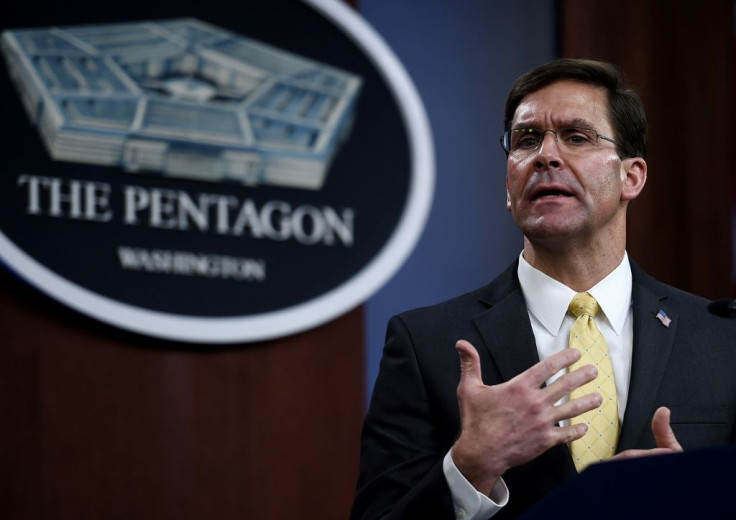Coronavirus Outbreak: Overseas Travel Of US Troops Halted By Pentagon To Curb The Spread

KEY POINTS
- Orders implemented to prevent troops from bringing the virus back home
- The order would impact service member, defense department civilians, and their families
- The Pentagon has advised troops to practice social distancing whenever possible
In order to contain and curb the spread of the novel coronavirus, the Pentagon has decided to halt the U.S. troops from traveling overseas for the next 60 days.
The order is one of the most sweeping to date and would impact the "exercises, deployments, redeployments and other global force management activities” of almost 90,000 U.S. troops over the next 60 days. Along with the service members, the order also applies to Defense Department civilian personnel and their families, a statement released by the Pentagon said.
“The purpose is to make sure that we’re not bringing the virus back home, infecting others, that we’re not spreading it around the military,” Reuters quoted Defense Secretary Mark Esper, who was speaking in an interview.
There are, however, exceptions, which include travel for medical treatment and the scheduled deployment of U.S. Navy vessels. The partial drawdown of the U.S. forces in Afghanistan would also continue, as per the deal which was signed with the Taliban last month. The U.S. has committed to reducing the number of troops in Afghanistan to 8600 within 135 days of the signing of the deal.
JUST IN: The Pentagon is halting all overseas travel for U.S. troops for up to 60 days in an effort to mitigate the spread of the novel coronavirus, according to a top U.S. official. https://t.co/LOEY67eUMt
— ABC News (@ABC) March 25, 2020
“That (stop movement order) should not impact that,” Esper said, regarding the withdrawal of troops.
The Pentagon has steadily increased the restrictions on its personnel, implementing various measures over the past few weeks to mitigate the spread of COVID-19. Earlier on Wednesday, the Pentagon raised its health protection condition, or HPCON, to “Charlie” - its second-highest level, indicating sustained community transmission.
Military bases and similar installations worldwide will only allow essential personnel and also limit the entry points. The Pentagon has also advised troops to practice social distancing whenever possible to minimize the spread of the fatal virus.
"You can't get social distancing in a submarine or even in a tank, right? I've been in both," ABC News quoted Esper saying at a Town Hall event on Tuesday. "But you take prudent measures as best you can, given the situation you're in, given your mission and whatnot."
"That's what we call upon commanders and senior (non-commissioned officers) at all levels to do: assess their situation, and if you can avoid putting people in -- a large number of people -- in small rooms, you should do it. Hold your meeting outside, or maybe meet in smaller groups. Get that social distancing as best you can," he added.
However, questions were raised as to why the troops were congregating in formations. While the defense department had suspended military exercises with Iraq and Afghanistan owing to the virus, stateside training has been allowed to continue without many changes. Esper responded to the concerns saying that the troops needed to maintain readiness, including physical fitness.
As of Wednesday, 53 new cases of infected service members had surfaced, taking the worldwide tally to 227, the Pentagon confirmed.
“Our curve is not flattening. And that’s why we went to HPCON Charlie today, which includes restrictions on large gatherings and includes additional social distancing,” Air Force Brigadier General Paul Friedrichs said in a news conference.
© Copyright IBTimes 2024. All rights reserved.





















